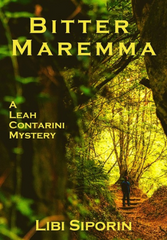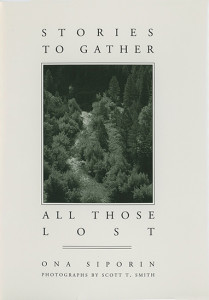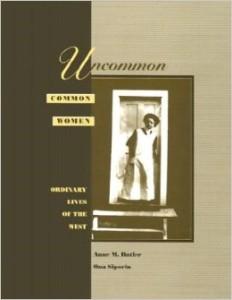 Set in Tuscany, Bitter Maremma, published by Level Best Books, features the impetuous Leah Contarini, a freelance writer who travels with her husband on a year’s research trip to Tuscany. Upbraided by husband, daughter, and friends for perpetually getting into trouble, Leah promises herself she will have a quiet year working on freelance travel articles. The text of her first article finished, she sets off early one morning for a hike on the ancient Etruscan trails to take photos for her piece. What could possibly happen? Well — murder. And Leah is a witness, with proof. Barely escaping the killer and suddenly entangled in local drug culture and the intrigue of family devastations, Leah outmaneuvers her husband Nick and the local police lieutenant to pursue a series of random clues that lead not to answers, but to a second body. Convinced the isolated trail of the Tuscan forest holds the answer to both deaths, Leah – ignoring strict orders to stay home – sets off alone. In a last, deadly encounter, she learns two things: evil can slip into the smallest cracks, and the love of a community can carry one through the hardest times. Bitter Maremma sets the stage for the next books in the Leah Contarini Mystery Series. From book to book, Leah suffers profound losses, learns how to grieve and then, with the help of friends, to laugh again, discovers secrets about herself that her mother should have told her. And through it all, she just can’t seem to avoid stumbling over bodies.
Set in Tuscany, Bitter Maremma, published by Level Best Books, features the impetuous Leah Contarini, a freelance writer who travels with her husband on a year’s research trip to Tuscany. Upbraided by husband, daughter, and friends for perpetually getting into trouble, Leah promises herself she will have a quiet year working on freelance travel articles. The text of her first article finished, she sets off early one morning for a hike on the ancient Etruscan trails to take photos for her piece. What could possibly happen? Well — murder. And Leah is a witness, with proof. Barely escaping the killer and suddenly entangled in local drug culture and the intrigue of family devastations, Leah outmaneuvers her husband Nick and the local police lieutenant to pursue a series of random clues that lead not to answers, but to a second body. Convinced the isolated trail of the Tuscan forest holds the answer to both deaths, Leah – ignoring strict orders to stay home – sets off alone. In a last, deadly encounter, she learns two things: evil can slip into the smallest cracks, and the love of a community can carry one through the hardest times. Bitter Maremma sets the stage for the next books in the Leah Contarini Mystery Series. From book to book, Leah suffers profound losses, learns how to grieve and then, with the help of friends, to laugh again, discovers secrets about herself that her mother should have told her. And through it all, she just can’t seem to avoid stumbling over bodies.
Buy on Amazon.
Stories to Gather All Those Lost
 This gathering of short personal essays grew out of Siporin’s regular radio commentaries on Utah Public Radio and live performances around Utah and the region. The essays, published by Utah State University Press, are short, evocative pieces, meditative in tone, taking up a range of subjects—including memory, travel, ethnicity, place, humor, love, conflict, and family. Siporin tells us that story itself is what we use to gather loved ones and experience to ourselves. This gentle function of narrative, and the voice of the storyteller herself, stitch these rewarding meditations together. Scott Smith’s photographs offer visual counterpoint to the text. His images—sometimes haunting, sometimes humorous are themselves meditations.
This gathering of short personal essays grew out of Siporin’s regular radio commentaries on Utah Public Radio and live performances around Utah and the region. The essays, published by Utah State University Press, are short, evocative pieces, meditative in tone, taking up a range of subjects—including memory, travel, ethnicity, place, humor, love, conflict, and family. Siporin tells us that story itself is what we use to gather loved ones and experience to ourselves. This gentle function of narrative, and the voice of the storyteller herself, stitch these rewarding meditations together. Scott Smith’s photographs offer visual counterpoint to the text. His images—sometimes haunting, sometimes humorous are themselves meditations.
“Ona Siporin brings us miracles of locality—from an Afghani bus, a Portuguese hair salon, the eden of the home farm in Iowa, and that canyon peoples with animals behind the house in Utah. Ona gives us back our own sacred nibbles of time. Readers will taste the vivid satisfaction that comes when you have to know something in the night, and you go seek it.”
—Kim R. Stafford
Buy on Amazon.
Uncommon Common Women: Ordinary Lives of the West
 Based on the successful lecture/performance that historian Anne M. Butler and Ona Siporin presented in eastern Canada, the eastern U.S., and throughout the Intermountain West, this work brings these two women’s art, scholarship, and wisdom to the printed page. Uncommon Common Women broadens and enriches the general reader’s understanding of women’s lives during the western emigration era. The authors cast a wide net: they are not interested in promoting the stereotypes of the West—the schoolmarm and the dance hall girl—but rather in bringing to notice the forgotten roles and gritty realities of women’s lived experience during what was often a brutally difficult time. This is a multi-genre piece, combining historical narrative with storytelling and photographs. Anne Butler’s historian’s voice provides a narrative matrix, describing the unvarnished experience of groups and individual women—nonwhite pioneers, indigenous women, criminls, nuns, educators, and suffragists—who have been largely ignored in the written histories. Siporin, the storyteller, offers a complementary dimension, creating individual vignettes of women who were or who might have been, often speaking through interior voices, personal and intense. The result is an unusually rich and rewarding book that offers many images and speaks in many voices.
Based on the successful lecture/performance that historian Anne M. Butler and Ona Siporin presented in eastern Canada, the eastern U.S., and throughout the Intermountain West, this work brings these two women’s art, scholarship, and wisdom to the printed page. Uncommon Common Women broadens and enriches the general reader’s understanding of women’s lives during the western emigration era. The authors cast a wide net: they are not interested in promoting the stereotypes of the West—the schoolmarm and the dance hall girl—but rather in bringing to notice the forgotten roles and gritty realities of women’s lived experience during what was often a brutally difficult time. This is a multi-genre piece, combining historical narrative with storytelling and photographs. Anne Butler’s historian’s voice provides a narrative matrix, describing the unvarnished experience of groups and individual women—nonwhite pioneers, indigenous women, criminls, nuns, educators, and suffragists—who have been largely ignored in the written histories. Siporin, the storyteller, offers a complementary dimension, creating individual vignettes of women who were or who might have been, often speaking through interior voices, personal and intense. The result is an unusually rich and rewarding book that offers many images and speaks in many voices.
“Ona Siporin has an uncommon knack for both storytelling and graceful language. Her prose style hints at the poetic and her personal involvement with her characters is such that you will know these women and feel their lives.”
—Amazon review
Buy on Amazon.